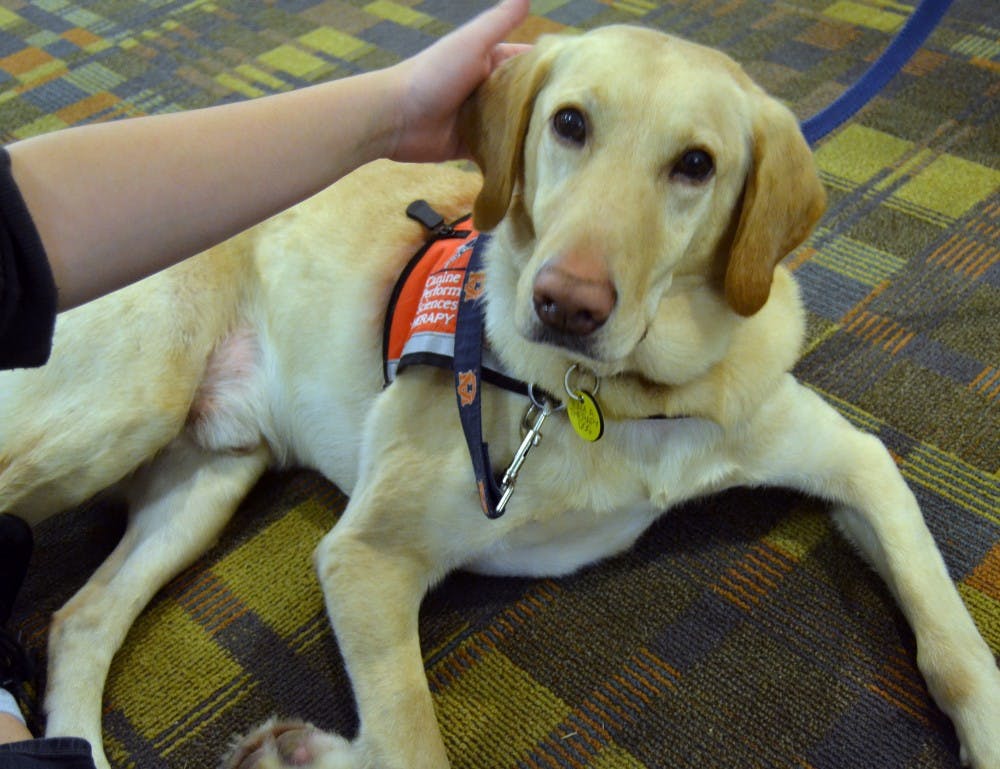The pandemic has changed the way therapy operates on campus, but access to animal-assisted therapy continues.
Doug Hankes became director of Auburn University’s Student Counseling and Psychological Services in 2007, and he has always known that there would be a place for animals in their services.
After becoming director, Hankes found an opportunity to acquire a therapy dog from the Canine Performance Sciences department of Auburn University that trains detection dogs.
“One of the qualities that you want in a detection dog is to ignore people and focus on the job, which is the complete opposite of what you want in a therapy dog,” Hankes said.
However, when Bart Rogers, one of the primary handlers of the CPS department, mentioned that they had a couple of dogs that were getting ready to retire and they had personalities that might be conducive for therapy dogs, Hankes was hopeful.
“They thought it would be a really interesting idea to see whether or not they could retrain a detection dog into a therapy dog,” Hankes said. “So, they kind of took it on as a challenge, and that’s how we got Moose about six years ago.”
Moose is a yellow labrador retriever, and he turned 12 years old in May.
Hankes said Moose is extremely disciplined, yet still very in tune with people’s emotions, which makes him a great therapy dog.
“When Moose went to take his test, a Doberman Pinscher attacked him in the waiting line for the certification process, and he didn’t even react or try to fight back,” Hankes said.
Therapy dogs are also trained to ignore loud sounds and distractions.
Hankes said while all staff are trained to work with the animals, they still need a home to stay in. Moose has been living with Hankes’ family for five years.
“That was a one-time deal,” Hankes said, reminiscing about how they got Moose. “When these dogs retire, they typically use them for doner purposes to help fund their programs.”
However, Rogers contacted Hankes again telling him he had a retiring dog, and he knew would be a good therapy dog.
Since the counseling services had moved to two locations, and only one was able to have a dog, Hankes said he gladly accepted the new addition to the team. Nessie is a half black labrador retriever and half German wirehaired pointer who also lives with Hankes.
“Any breed of dog could potentially be a therapy dog; it’s really about the training and the personality and their attention to humans,” he said. “The thing that made both Nessie and Moose good therapy dogs is that they have such a high desire to please the owner or the handler. They just want to work.”
The dogs work in therapy sessions, but they have an attention-grabbing ability that is perfect for outreach events, Hankes said.
“If you’re having a table event and students see the Counseling Center and they see mental health, they turn their head and walk the other direction a lot of times,” he said. “But if you’ve got a dog, everybody wants to pet the dog.”
The dogs can be used in individual or group therapy sessions, but Hankes said that the dogs often become more of a distraction rather than a tool in the group sessions.
However, he said the dogs become very helpful in individual therapy sessions, especially those centered around trauma.
“Both are really sensitive with changes in emotion, and so if [the student is] starting to become really upset, then the dogs pick up on that and they just kind of present themselves to the client,” he said. “They won’t hop up in their lap. They’ll usually just put their head in their lap.”
The student usually pets the dog to ground themselves while dealing with emotional trauma that could otherwise cause them to feel disconnected.
Since in-person therapy has come to a halt, the dogs along with SCPS have found a safe, socially distanced way to still connect with students.
One of the outreach events is “Get Mov’in with Moose, Destressie With Nessie.”
Every Monday at 8 a.m. and Thursday at 4 p.m. Moose or Nessie meets with any students who want to join on a 2- to 3-mile walk around campus. They start at the Starbucks on campus outside the Student Center.
Do you like this story? The Plainsman doesn't accept money from tuition or student fees, and we don't charge a subscription fee. But you can donate to support The Plainsman.





